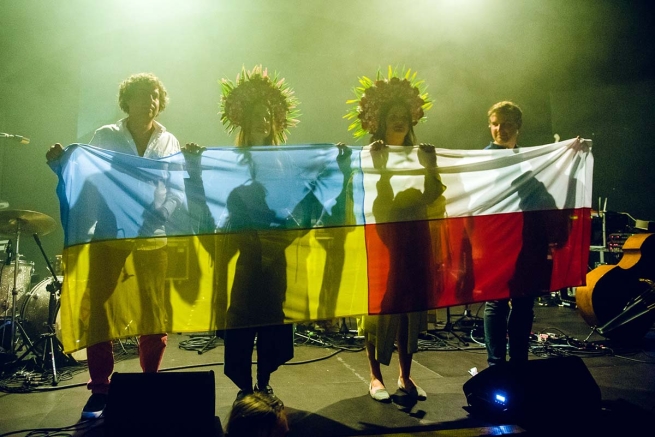All those who are currently refugees abroad have had very strong experiences in their escapes: those who have experienced severe hardship during their journey, those who have had to flee amid bombings and gunfire, those who have suffered fraud or exploitation, experienced racism or xenophobia, theft, attacks...
Thus being able to experience environments of serenity, recreation, beauty, and cultural and artistic richness for them represents so much. This is also testified to by a young Polish volunteer who interacted with some Ukrainian refugees, young and old, as part of the recent Festival "Without Borders" in Różanystok, an annual event promoted by the Salesians, which each year gathers young people from different countries, where in addition to performances, several workshops are held each day through which the animators pass on their skills in a large number of areas: singing, acrobatics, performing arts, percussion, all forms of juggling, mimicry, puppet theater, beatboxing, rap and break dancing.
If in the past Ukrainian children came there for pleasure, this year they came there out of necessity (a total of 60 Ukrainian children and youth participated, out of a total of about 300 people).
One evening the young Polish volunteer, serving tables, approached a couple of Ukrainian kids - 11 years old he, 13 years old she - and talked to them a little bit using Russian as a vehicular language:
"I asked if their town had been bombed, and even as the words were leaving my mouth, I realized I shouldn't have asked. But the girl, again in an incredibly calm tone, says as if it were something quite mundane and ordinary: 'Yes, was bombing,' and the boy nodded. After that, I avoided any reference to war. We continue our casual conversation, touching only on topics that school children are usually interested in, schools, the end of classes, summer vacation... They told us that Polish school is different from Ukrainian school, but it’s getting easier by the day... And they said that the Festival was wonderful, as you could participate in the workshops and learn new things, and have a great time. They loved the final concert when the whole audience came to the stage and danced together to the music, and Polish and Ukrainian flags were unfurled on the stage... We finished dinner and I thanked them for the meal together, but they stayed at the table and talked some more about their own things, which no European can really understand. But not just because they speak in Ukrainian."
The next day our volunteer went on to dialogue with some adult refugees:
"They use the international word trauma: they talk about the artillery shelling, the fighting, and capture of their hometown. And about life in the city occupied by Russian troops, the dramatic decision to go abroad, the Russian checkpoints, the long interrogations by armed soldiers, the wreckage of burned and crushed cars by the side of the road, the huge crowds of women and children on the platform of the Lviv train station, the relief after crossing the border and the even greater relief when it was discovered that all Ukrainians are allowed to cross into Poland without any restrictions. They also tell of being cared for by Polish charities, and the local and central government. They were provided with housing and a school or kindergarten for the children, a job for some mothers, and 100 euros a month for each Ukrainian child, which is exactly what every Polish child receives. And about homesickness..."
In September, with the start of the school year, 600,000 Ukrainian students will be studying in Polish schools.


